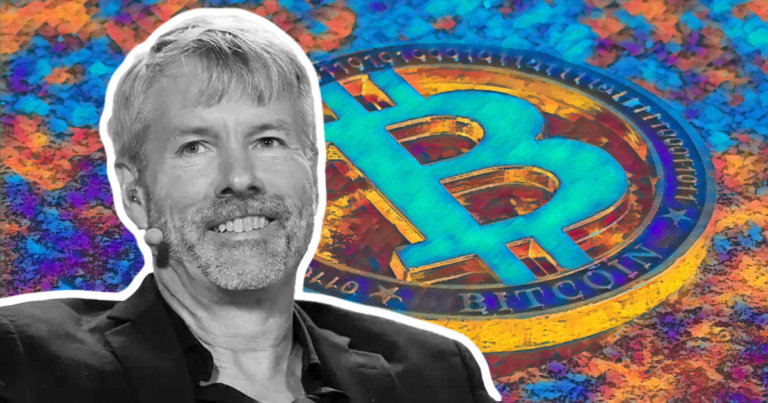 Bitcoin not a commodity or security declares Saylor as he hits back at regulators
Bitcoin not a commodity or security declares Saylor as he hits back at regulators Bitcoin not a commodity or security declares Saylor as he hits back at regulators
Bitcoin could be defined as a new asset class; a scarcity. The global currency market is collapsing. Bitcoin is the only way to short the dollar and Saylor thinks you should.

Cover art/illustration via CryptoSlate. Image includes combined content which may include AI-generated content.
Speaking on PBD Podcast on March 1, Michael Saylor claims that BTC should be defined as the world’s only actual scarcity rather than a commodity or security.
The Commodity Futures Trading Commission (CFTC) and the Securities Exchange Commission (SEC) have been at odds recently over who should have jurisdiction over cryptocurrency within the U.S. Each is arguing that crypto, and specifically Bitcoin, is either a commodity or security, with both vying for control of the $2 Trillion asset class.
Saylor’s need for a scarce asset
Saylor describes how the pandemic made him rethink his view on money as a concept and question his entire business strategy for securing wealth. Due to the amount of money printed globally since 2020, Saylor believes the value of fiat has collapsed in real terms.
He regards the stock market rally of 2020-2021 as the dollar collapsing in real-time against scarce assets. 30% of all money in circulation was printed after May 2020. Saylor uses this figure to indicate that anyone holding cash has lost 30% of the value in the past two years.
The M1 money supply had an initial surge at the pandemic’s start in 2020. However, from May 2020 to May 2021, it increased 18% and since then has grown another 7.2% in 9 months. Saylor sees this, coupled with inflation and other supply chain issues, as evidence that holding cash is a bleeding value.
If the value of money decreases, then Saylor believes he has a duty of care to his shareholders to invest the company’s reserve treasury in another asset class. Looking for a scarce asset, he explored investing in property, stocks, bonds, and even artwork before deciding to invest in Bitcoin.
Stocks aren’t scarce; he says, “if the stock is overvalued versus the fundamentals of the company, the CEO is almost certainly going to issue more stock.” Specific property may be scarce, such as in New York, Miami, Los Angeles, or London.
However, he argues that “the currency collapses the value of the rental income also collapses” or “Mayors are going to pass a property tax, and they’re going to put some kind of enjoinder or some kind of restriction on your rents.”
Ultimately, Saylor says he wished there was some form of virtual property he could buy that wasn’t restricted by geography or currency. That’s when he fell in love with Bitcoin.
He makes a bold statement regarding the nature of Bitcoin and its uniqueness due to being reliant on remembering the private keys to your wallet.
“Every other form of property in the history of the human race. I pull the gun I get it all. Right, my incentive is to violence. With Bitcoin, I pull the trigger I get none of it.”
Bitcoin is scarcity
There will only ever be 21 million Bitcoin in existence, or digital skyscrapers as Saylor calls them. These skyscrapers can never be taken from you without your consent and are permanently scarce.
Bitcoin is the definition of scarcity, he claims, and the only genuinely scarce asset in the world. All money is the byproduct of energy in some form. Saylor calls it “economic energy social, political energy.”
Whether it be mining, services, or entertainment, in order to create money, energy has to be expended. This is also true of Bitcoin but in an even more direct form. Technology has advanced to the purest and most efficient form of holding energy through the creation of Bitcoin.
Further, Bitcoin is liquid; owners can transfer it globally in seconds. However, if the form of energy you hold is not scarce, your amount is never truly representative of its actual value. Bitcoin does not have this problem.
“Scarcity is something of which it is absolutely capped if the price goes up by a factor of a thousand or a million it is absolutely capped that is not the case with gold soybeans silver stock bonds real estate single family homes ships planes trains nothing else.”
So if Bitcoin is a new asset class, one that is entirely exclusive to blockchain technology, then it cannot be a commodity nor security. However, the SEC and CFTC have an altogether different view from Saylor.
SEC vs CFTC on cryptocurrency
In 2018, the SEC was willing to accept that Bitcoin was not a security, but tokens that yield a return, such as in DeFi, should be regulated under the SEC as securities. The then SEC Chair Jay Clayton declared:
“To the extent that digital assets like [initial coin offerings, or ICOs] are securities — and I believe every ICO I have seen is a security — we have jurisdiction, and our federal securities laws apply.”
However, current SEC Chair Gary Gensler now focuses on crypto exchanges, DeFi, and stablecoins, believing they should all be under his regulatory control. He went as far as to claim that stablecoin may affect the United States’ national security.
In addition, Gensler, who taught finance in relation to the blockchain at MIT, stated that “these stablecoins also may be securities and investment companies”, firmly aligning them to regulation under the SEC.
The story continues as in August last year, Brian Quitenz, a commissioner for the CFTC, continued the debate stating:
“Just so we’re all clear here, the SEC has no authority over pure commodities or their trading venues, whether those commodities are wheat, gold, oil …. or crypto assets.”
Further, in testimony this February, at the U.S. Senate Committee on Agriculture, Nutrition, and Forestry, current CFTC Chair Rostin Behnam lay the foundations for what the future of crypto regulation may look like. He gave an insight into the CFTC position as he lay claim to the “cash digital asset commodity market” whilst staying quiet on the issue of yield-bearing assets such as DeFi tokens and stablecoins.
He praised the inter-departmental work on crypto regulation, perhaps paving the way for the SEC to take control of DeFi and leave the CFTC with ‘cash asset’ cryptocurrencies.
“The digital asset industry in the U.S. does not fall under a single comprehensive regulatory regime. Instead, the CFTC and other federal agencies and state regulators have all been responsible for collectively establishing the existing, and very incomplete, regulatory environment.”
Benham has said previously that “it’s critically important to have a primary cop on the beat, and certainly the CFTC is prepared to do that if this committee so wishes.” We will find out soon enough whether he now believes that cop needs a partner.
Commodity vs Security
A commodity is a fungible economic good or resource interchangeable with other commodities of the same type. In comparison, a security refers to a fungible, tradeable financial instrument. The legal definition varies by jurisdiction. The U.S. Congress defines a security as:
“Any note, stock, treasury stock, security future, security-based swap, bond, … investment contract, voting-trust certificate, … or any certificate of interest or participation in, a temporary or interim certificate for, receipt for, guarantee of, or warrant or right to subscribe to or purchase, any of the foregoing.”
There is a strong case for characterizing many DeFi instruments included in smart contracts and yield farming as a security from the above definition. An NFT, definition, seems to disqualify itself from being either of the asset classes due to its non-fungible nature. Saylor, a Bitcoin maximalist, may agree with Gensler on the matter of DeFi. He has already decided that Ethereum is a digital security.
However, his view on Bitcoin seems at odds with both the SEC and CFTC’s position on the most significant crypto asset by market cap. Bitcoin is a unicorn to Saylor; nothing in the world can match it.
However, any token without an ICO or pre-mine has the same monetary features as Bitcoin. Anyone can create a fork of Bitcoin, copy the ledger and operate Bitcoin 2022 (BTC2022), as has already happened with BCH and BSV. Further, if you then peg your new BTC2022 token to the value of BTC, you could argue that you have doubled the supply just like a CEO issuing more stock.
If I can buy BTC using BTC2022, then is it fungible? These are the questions that make blockchain so exciting. We are experiencing a new world of digital monetary technology. No one has all the answers right now, but conversations like those by Michael Saylor will help us find our way one way or another.















































































































